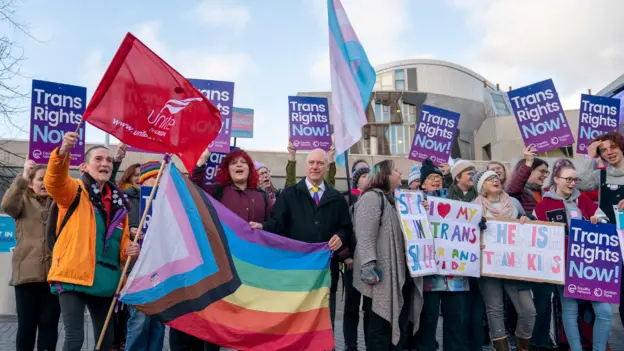Supreme Court hearing case on definition of a woman
Tue Nov 26, 2024 10:56 pm
Judges at the Supreme Court are considering how women are defined in law in a landmark case brought by Scottish campaigners
It is the culmination of a long-running legal dispute which started with a relatively niche piece of legislation at the Scottish Parliament, but which could have big UK-wide implications.
It will set out exactly how the law is meant to treat trans people, and what it really means to go through the gender recognition process.
And it could have implications for the running of single-sex spaces and services, and how measures aimed at tackling discrimination will operate in future
The case started on Tuesday, with judges hearing from lawyers acting on behalf of the For Women Scotland campaign group, which is concerned about the potential impact of trans rights on women's rights.
The Scottish government's legal representatives will address the court on Wednesday, before the judges retire to consider their ruling - which could take several weeks.
At the most basic level, the case centres on what “sex” actually means in law.
Is it about biology and chromosomes set at birth, or does it tie in ideas of gender identity and the gender recognition process?
The Gender Recognition Act of 2004 established the process for obtaining a gender recognition certificate - something it states amounts to a change of sex “for all purposes”.
When someone gets a gender recognition certificate, "if the acquired gender is the male gender, the person's sex becomes that of a man, and if it is the female gender, the person's sex becomes that of a woman".
Then the Equality Act of 2010 came along to set out legal protections against discrimination for specific groups - with “sex”, "sexual orientation" and “gender reassignment” included as protected characteristics.
It simply defines a woman as "a female of any age".
There has been much dispute about how these two pieces of legislation sit together.
When the Equality Act talks about “sex”, does it mean biological sex - or legal, "certificated" sex as defined by the GRA?
This case won’t change the letter of the law, but a ruling on how it should be interpreted could have big implications for how all kinds of public bodies and services operate, and whether others might be open to legal challenges.
Judge Lady Haldane ruled in December 2022 that the definition of sex was “not limited to biological or birth sex”, but included those in possession of a gender recognition certificate.
That ruling is what For Women Scotland are challenging at the Supreme Court.
They have already lost one appeal in the Scottish courts, but judges in Edinburgh agreed to push the case straight to the Supreme Court in London for a definitive ruling.

